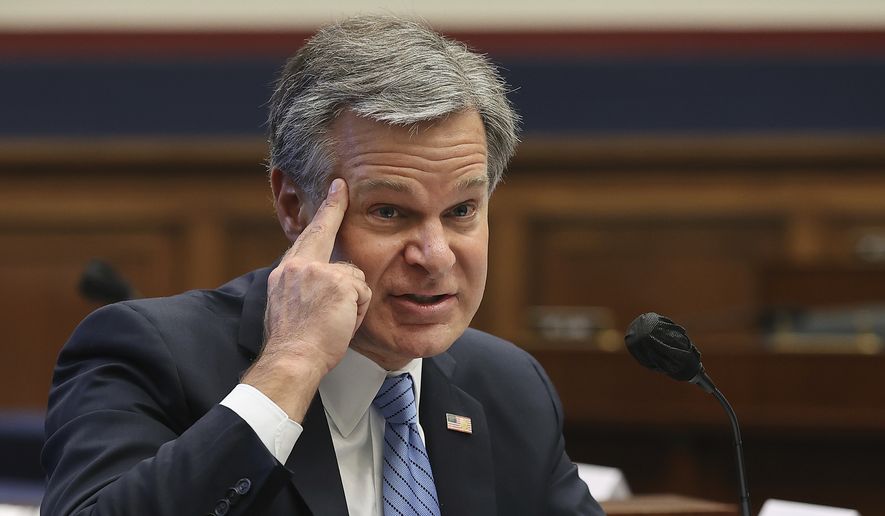China is engaged in massive data mining in the United States and likely has stolen personal information on nearly half of the entire U.S. population, FBI Director Christopher Wray told a congressional hearing last week.
While media attention focused on Mr. Wray’s comments on the threat of domestic terrorism and foreign interference in the upcoming election, the FBI director also offered fresh details on the scale of Chinese hacking efforts, such as the 2017 theft of financial information on 150 million people from the credit bureau Equifax.
Mr. Wray disclosed to lawmakers that the FBI now estimates that Chinese hackers have obtained compromised information on “nearly half of the American population and most American adults.”
“If you are an American adult, it is more likely than not that China has stolen your personal data,” Mr. Wray told the House Homeland Security Committee on Thursday, adding the theft is “on a scale so massive that it represents one of the largest transfers of wealth in human history.”
Other Chinese data hacks over the past five years involved gaining access to more than 60 million records from the health care provider Anthem and more than 22 million records from the federal government’s Office of Personnel Management, including very sensitive data gathered as part of security clearance probes.
Mr. Wray described the targeting of U.S. information and intellectual property as the “greatest long term threat” posed by a foreign spy service. Chinese intelligence regards itself as being in “an international talent war” to obtain U.S. innovation capabilities and research. Much of the stolen American know-how has been funded by U.S. taxpayers who are in effect funding Chinese advancement, the FBI director said.
The State Department’s ordering of the recent shutdown of the Chinese consulate in Houston highlighted the economic espionage danger, he said. U.S. officials say the Houston consulate was a major base of Chinese spying, a charge Beijing has denied.
While the FBI chief did not provide details on how the Chinese exploit the data, other counterintelligence officials have said the Chinese use stolen personal data to recruit agents and to launch cyberattacks targeting computer administrators with access to networks. Mr. Wray said aggressive Chinese intelligence operations have prompted the FBI to open a new China-related counterspy case on average every 10 hours.
“Of the nearly 5,000 active FBI counterintelligence cases currently underway across the country, almost half are related to China,” he said.
Federal prosecutors announced Wednesday the indictment of five Chinese nationals and two Malaysians in a large-scale criminal and political hacking operation targeting more than a 100 U.S. and foreign corporations. The FBI also has cracked down on American university professors suspected of covertly being paid by China, including the chairman of the Harvard University chemistry department, Charles Lieber, who in January was charged with lying to investigators about his role in a Chinese program to recruit technical experts.
“At this very moment, China is working to compromise American health care organizations, pharmaceutical companies, and academic institutions conducting essential COVID-19 research,” Mr. Wray said. “They are going after cost and pricing information, internal strategy documents, personally identifiable information — anything that can give them a competitive advantage.”
Democrats in Congress have claimed the Trump administration is persecuting Asian-Americans by calling the microbe behind the pandemic the “Chinese virus.” The House on Thursday passed a resolution condemning “anti-Asian sentiment related to COVID-19,” the virus first identified in Wuhan, China.
But Mr. Wray told the hearing that the FBI campaign is not broadly targeting Chinese or Chinese-Americans, but rather Chinese government and suspected agents of the ruling Communist Party. He said confronting the Chinese intelligence threat does not mean the United States cannot coexist with China.
“But it does mean that when China violates our criminal laws and international norms, we are not going to tolerate it, much less enable it,” he said. The pandemic has forced people into greater reliance on computer networks and that in turn has increased the danger of cyber espionage.
“We are still seeing hack after hack and breach after breach,” Mr. Wray said. “The more we shift to the internet as the conduit and the repository for everything we use and share and manage, the more danger we are in.”
• Bill Gertz can be reached at bgertz@washingtontimes.com.




Please read our comment policy before commenting.